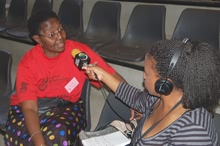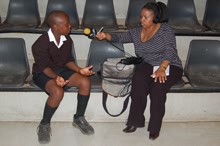SAEON in the media
|
The following press release went out to the media:
NATIONAL SCIENCE WEEK AIMS TO EXPOSE LEARNERS TO SCIENCE AND TECHNOLOGY
|
May 13 to May 21 is National Science Week (NSW06) in South Africa, an annual event held simultaneously in all nine provinces.
The event promotes the celebration of the importance of science, engineering and technology in people’s daily lives, and aims to maximise exposure of learners to potential careers in science and technology. In addition, the week aims to promote science literacy among the youth and general public, and to contribute to the identification of talent and potential in learners.
In BaPhalaborwa municipality, NSW06 activities will take place mainly in the town hall of Lulekani township. The Week, which is organised by staff of the South African Environmental Observation Network (SAEON) and the Palabora Foundation working closely with the Department of Education, is funded by the Department of Science and Technology.
Activities kick off with an 8.5-km fun run on Saturday 13th May, starting at the Lulekani town hall at 07:30. This is followed in the week (15 to 19 May) by displays by the SAAF base in Hoedspruit, the South African Weather Service and the Working for Water Programme, as well as interactive activities and puzzles provided and guided by staff of the South African Agency for Science and Technology Advancement (SAASTA).
Parallel to this there will be presentations by scientists and veterinarians from Kruger National Park, the Transvaal Museum and SAEON. These will range in topics from the science of game capture and disease control to the role of insects and biodiversity in our lives, as well as overviews of global warming and its implications for our lives.
Small selected groups of learners will go on trips to Kruger National Park and Foskor Mine. Over and above this school-centred programme that 50 learners each from 50 schools will attend during the week, there will be evening talks (at 18:30) in the Lulekani and Namakgale town halls. These talks will be open to the public and will cover a range of topics from global warming to the technology of pottery presented by a local potter.












